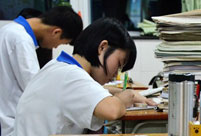 Luoyang aims to become 'Chinese Culture City'
Luoyang aims to become 'Chinese Culture City'
 Century-old jade disc found confirms ancient legend
Century-old jade disc found confirms ancient legend
 A serious mind behind Chinese leader
A serious mind behind Chinese leader
 Panda Cubs to Predict 2014 World Cup Winners
Panda Cubs to Predict 2014 World Cup Winners
 China Southern Airlines flight attendants win titles in service contest
China Southern Airlines flight attendants win titles in service contest
 Pupil's performance art persuades people to stop smoking
Pupil's performance art persuades people to stop smoking
 Nie Chenxi's clay tigers
Nie Chenxi's clay tigers
 Children's Day wishes
Children's Day wishes
 Chinese Kung Fu charms Silicon Valley
Chinese Kung Fu charms Silicon Valley
 Tranquil Yankou ancient town
Tranquil Yankou ancient town
POSITIVE DEVELOPMENT
Fortunately, the economic drag on the Chinese economy has not been so significant, and the strength of the global economy and exports has offset the slight slowdown of Chinese domestic demand, noted the senior international economist.
China's trade with the United States, the EU, Japan and the ASEAN rose 2.4 percent, 8.5 percent, 1.6 percent and 1.2 percent respectively in the first four months of 2014.
"It is unambiguously good news that the U.S. economy seems to be picking up some steam," said Lipton, former senior director for international economic affairs at the National Economic Council and National Security Council at the White House.
Europe is registering a "tentative" recovery, but some emerging market countries are seeing slower economic growth. Despite day-to-day economic data fluctuations, the U.S. economy is gathering strength that is good for the global economy due to greater demand for exports including those from China, according to Lipton.
However, he cautioned, "That doesn't come without risk. As the U.S. economy recovers, the Fed is more likely to carry on its normalization of interest rates and the monetary policy which is very accommodative. That is a process that may have ramifications for financial markets and for capital flows."
Since the onset of the financial crisis, the U.S. central bank has kept its short-term interest rate at a historically low level and rolled out three rounds of quantitative easing programs involving purchasing longer-term government debt and mortgage-backed securities to bolster lending and economic growth.
Overall, Lipton said, the combination of a recovering U.S. economy and normalization of the Fed's monetary policies is a positive development for the world. But for many countries, there will be financial market consequences as U.S. interest rates rise and as volatility returns to markets. It's a "meaningful challenge" for many emerging market countries.
"It's less of an issue directly for China, because China's capital account is not as open as other countries', and China's economy is not as vulnerable to swings of portfolio flows. But if other emerging market countries have difficulties, there may be indirect effects for China," he stressed.
Speaking at a press briefing held in Beijing on Thursday, Lipton said that China depends on the rest of the world, and China's economy affects the rest of the world.
An IMF delegation led by Markus Rodlauer, deputy director of its Asia and Pacific Department, visited Beijing, Shanghai and Shenyang from May 22 to June 5 to discuss the annual Article IV review of the Chinese economy.
"The improving global outlook should support exports during the second half of the year. This will help compensate for slowing domestic demand that, in part, reflects a welcome moderation in credit and investment growth," the IMF said in a statement released on Thursday.
 |
 Magnificent Hutiao Gorge
Magnificent Hutiao Gorge  Heat waves hit China
Heat waves hit China Love at the construction site
Love at the construction site Graduation photos bring memories back to life
Graduation photos bring memories back to life Art school students present works in Nanjing
Art school students present works in Nanjing Xinjiang's first high-speed railway goes on trial run
Xinjiang's first high-speed railway goes on trial run 3D Sea-life Themed Art Garage unveiled in Zhengzhou
3D Sea-life Themed Art Garage unveiled in Zhengzhou
 Creative Photos go viral during graduation season
Creative Photos go viral during graduation season Students in last-minute effort for Gaokao
Students in last-minute effort for Gaokao Dali, an ideal summer vacation destination
Dali, an ideal summer vacation destination Xichan Temple's little monk hit the Internet
Xichan Temple's little monk hit the Internet Monologue of a modern dancer
Monologue of a modern dancer College girl proposes to boyfriend on Weibo
College girl proposes to boyfriend on Weibo Special operation members in counter-terrorism training
Special operation members in counter-terrorism training American football brings manhood out of boys
American football brings manhood out of boysDay|Week|Month